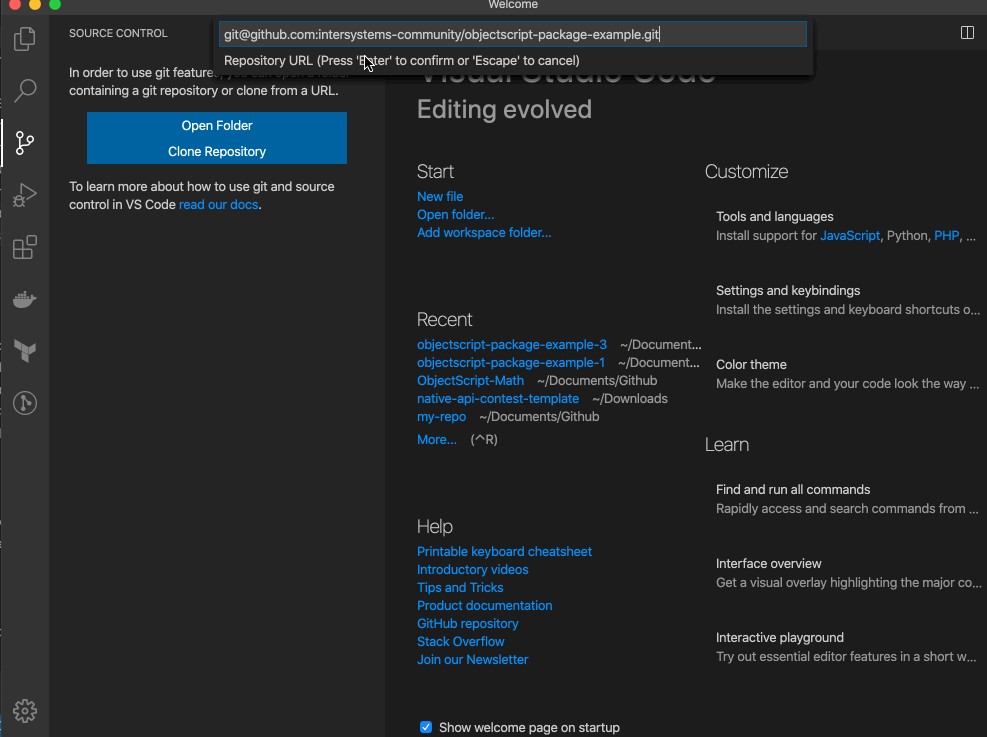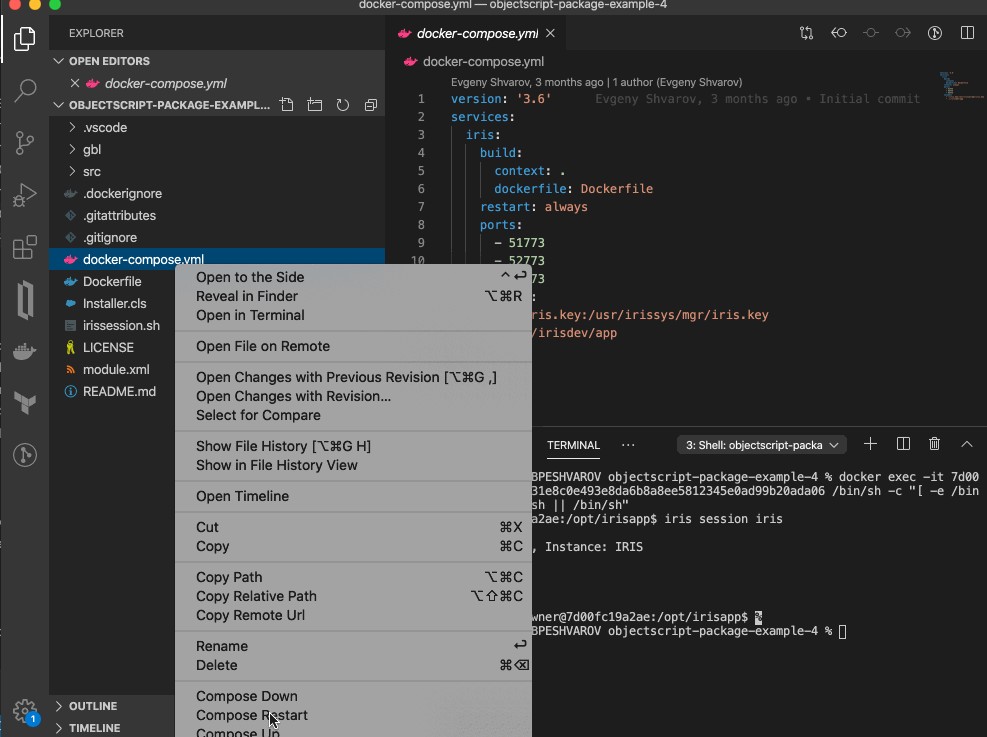Unit Testing with ZPM
Hi Developers!
I want to share with you the approach you can use working with Unit Testing which I personally find very convenient and robust.
Will not talk much here about Unit Testing, we have documentation, enough good articles on the topic not only on the Internet but here on Developers Community too, e.g. this one.
How can you manage the Unit Testing of your ZPM module?
This is pretty handy with ZPM. It has a special command "test" which runs all the tests you mentioned in the module. You can execute it as shown below:
zpm:USER>module-name test
And this command runs all the tests you mentioned in module.xml.
Let's see how it works.
Clone and open package example repo in VSCode.

Run docker container with IRIS and preinstalled ZPM-client:

As you see in the module.xml the name of the module is "objectscript-package-example".
Let's test it in IRIS terminal.
USER>zn "IRISAPP" zpm:IRISAPP>load objectscript-package-example
And we can test it:
zpm:IRISAPP>objectscript-package-example test [objectscript-package-example] Reload START [objectscript-package-example] Reload SUCCESS [objectscript-package-example] Module object refreshed. [objectscript-package-example] Validate START [objectscript-package-example] Validate SUCCESS [objectscript-package-example] Compile START [objectscript-package-example] Compile SUCCESS [objectscript-package-example] Activate START [objectscript-package-example] Configure START [objectscript-package-example] Configure SUCCESS [objectscript-package-example] Activate SUCCESS [objectscript-package-example] Test START Use the following URL to view the result: http://192.168.80.2:52773/csp/sys/%25UnitTest.Portal.Indices.cls?Index=11&$NAMESPACE=IRISAPP All PASSED [objectscript-package-example] Test SUCCESS
As we see it passed all the tests.
We can see more details if we pass "-v" clause:
Let's see how it all works.
The module.xml has the one line which describes unit tests:
<UnitTest Name="src" Package="UnitTests" Phase="test"/>
This line means that ZPM will look in /src folder of the repo and will run all the tests of all the classes which are included in UnitTests package.
Here we have two test classes, so both will be executed.
Let's change something in the source code to let the test fail.
In the TestClassExample test we have method:
Method TestFortyTwo()
{
Set tResults=##class(community.objectscript.ClassExample).FortyTwo()
Set tExpected=42
Do $$$AssertEquals(tResults,tExpected,tExpected_" = "_tResults)
}This test method covers the related method FortyTwo in objectscript.ClassExample:
ClassMethod FortyTwo() As %Integer
{
return 42
}Let's change it to make it return 43 and Save:
ClassMethod FortyTwo() As %Integer
{
return 43
}And run tests again:
zpm:IRISAPP>objectscript-package-example test -v ... [objectscript-package-example] Test START ... UnitTests.TestClassExample begins ... TestFortyTwo() begins ... AssertEquals:42 = 43 (failed) <<==== **FAILED** (root):UnitTests.TestClassExample:TestFortyTwo: LogMessage:Duration of execution: .000028 sec. ... zpm: IRISAPP>
So this test failed as planned. Perfect!
But it's a very artificial example. Let's fail the test which checks something closer to the real world.
Check another test case:
Here is the related test method in another test class UnitTests.TestPersistentClass:
Method TestCreateRecord()
{
do $$$AssertStatusOK(##class(community.objectscript.PersistentClass).CreateRecord(),"Create Record test")
}Which covers the method CreateRecord in objectscript.PersitentClass:
ClassMethod CreateRecord() As %Status
{
s objPC=..%New()
s objPC.Test="Test string"
return objPC.%Save()
}As you see in source of the PersistentClass it has one property Test with MAXLEN limit of 12 symbols:
Property Test As %String(MAXLEN = 12);
Let's exceed the length to fail the save record method and change the code to the following:
ClassMethod CreateRecord() As %Status
{
s objPC=..%New()
s objPC.Test="Test very long string"
return objPC.%Save()
}Save it and then run the test again:
zpm:IRISAPP>objectscript-package-example test -v
...
[objectscript-package-example] Test START
...
UnitTests.TestPersistentClass begins ...
TestCreateRecord() begins ...
AssertStatusOK:Create Record => ERROR #7201: Datatype value 'Test very long string' length longer than MAXLEN allowed of 12
> ERROR #5802: Datatype validation failed on property 'community.objectscript.PersistentClass:Test', with value equal to "Test very long string" (failed) <<==== **FAILED**
(root):UnitTests.TestPersistentClass:TestCreateRecord:
LogMessage:Duration of execution: .001794 sec.
TestCreateRecord failed
UnitTests.TestPersistentClass failedAs you see our second TestCreateREcord test failed.
That's it!
I want to add, that you can use this approach not only to create packages but also to simplify and automate your testing and deployment procedures!
Also, you may find interesting @Timothy Leavitt's article on how you can check the test coverage of your project with ZPM and Mocking Framework article by @AndreClaude Gendron .
Happy coding!
Comments
It is realy interesting to know
You wrote
The module.xml has the one line which describes unit tests:
<UnitTest Name="src" Package="UnitTests" Phase="test"/>This line means that ZPM will look in /src folder of the repo and will run all the tests of all the classes which are included in UnitTests packageIs
Is this to say the Name="src" means it will look on the machine where the module has been installed in the /src folder? If this is so this is problematic for us I believe. We are trying to protect our IP and as part of the Module.xml definition we have 2 Invokes that help with this effort
1. <Invoke Class="RCIPM.Utils" Method="MakeModuleDeployed" Phase="Compile" When="After" CheckStatus="false"> We do this because there are some classes which cannot be marked as Deployed as they need to be compiled additional times on the application namespaces after we have run the install command in HSCUSTOM
2. <Invoke Class="RCIPM.Utils" Method="DeleteModulesFolder" Phase="Activate" When="After" CheckStatus="true">
If we don't delete the Module folder then our classes are there in plain text and could be lifted off of the server.
so if Name="src" mean look in the /src folder on the target machine(not the registry) then this wouldn't work for us.
That's not to say that DeleteModulesFolder doesn't cause other issues but its currently what we feel we need to do to protect our code.
Hi @Stephen Canzano !
Unit tests are not included into the package when you publish it into repository. So when you install the package on a target machine only "solution" classes will be installed, not unit-tests.
E.g. here is csvgen app. I you check the source code it contains "solution" classes in src folder here and unit-tests in /tests folder.
module XML for csvgen has resources, that will be packaged while published in the IPM registry:
<Resource Name="community.PKG"/>
and the unittests, that are being used only development phase and can be imported to the system via load command:
<UnitTest Name="/tests" Package="community.csvgen.UnitTests" Phase="test"/>
So when you install csvgen package, e.g.:
USER>zpm "install csvgen"
you'll see only RESOURCES classes installed.

In order to protect the IP you can use "Deployed packages" mode, see the documentation. Just include Deploy="true" in a resource element, and only compiled code will be installed.
<Resource Name="Sample.Demo.PKG" Deploy="true"/>
Load command locally still will import package with the source code, which is quite handy for development and testing.
Now answering your question :)
Name="src" means the folder related to the one where module.xml is situated on the development/testing or publishing machine.